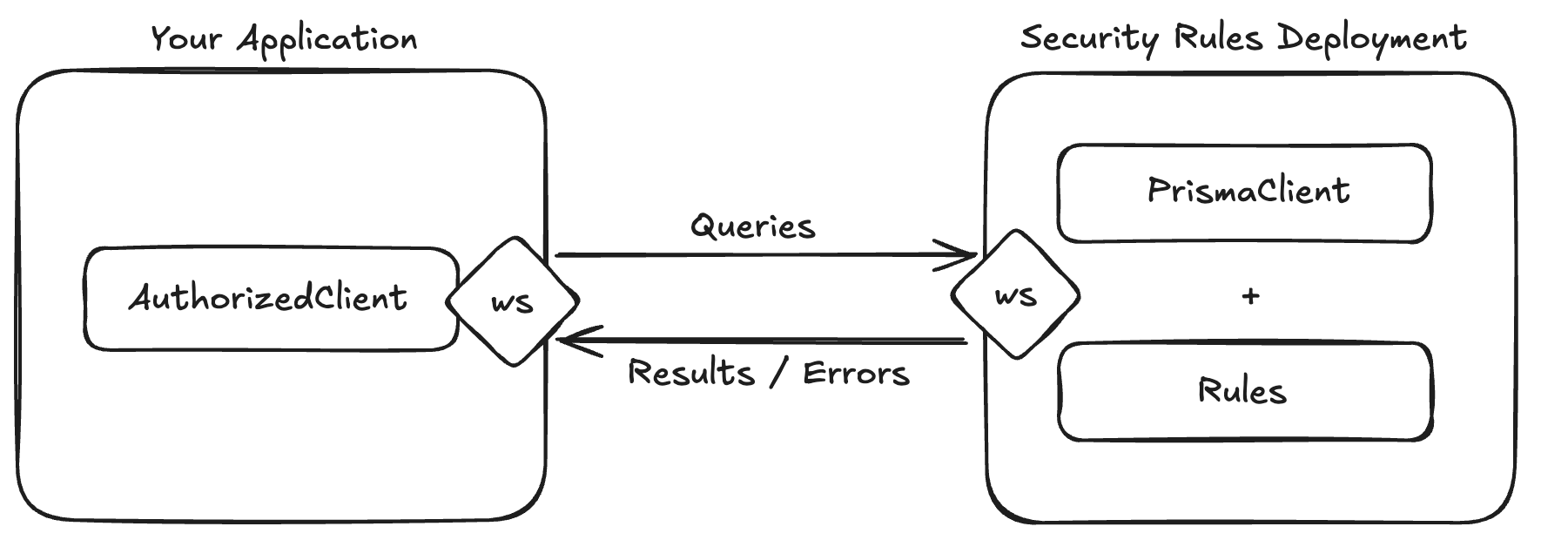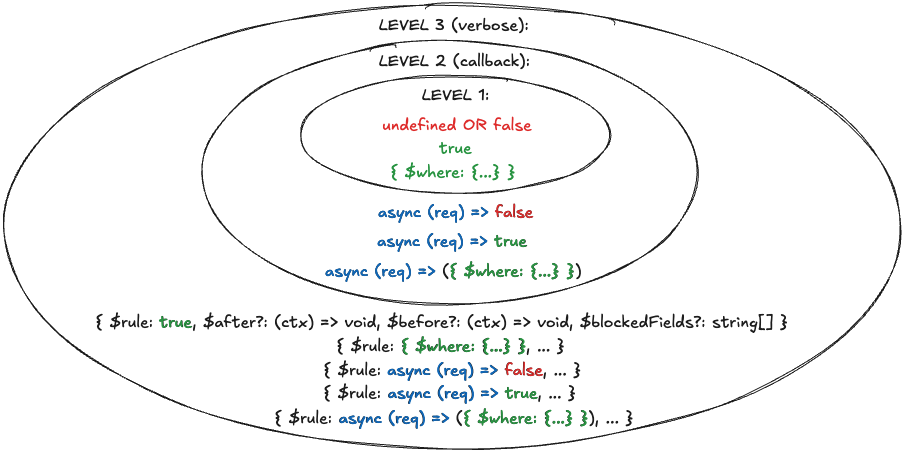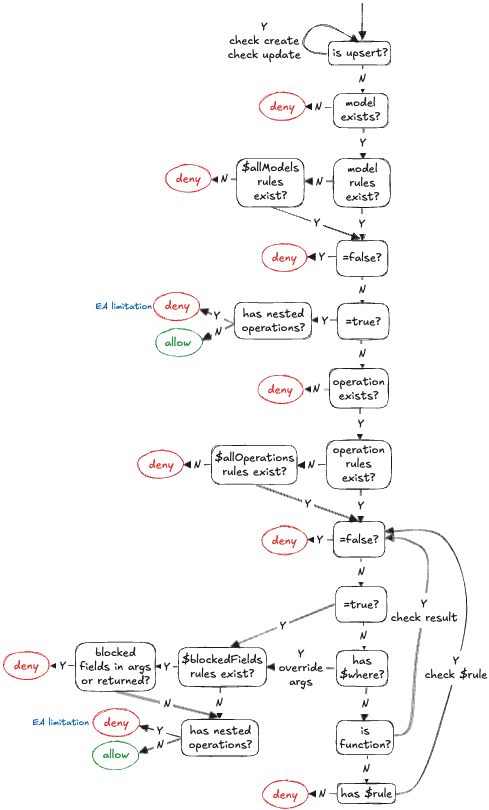
Security News
ECMAScript 2025 Finalized with Iterator Helpers, Set Methods, RegExp.escape, and More
ECMAScript 2025 introduces Iterator Helpers, Set methods, JSON modules, and more in its latest spec update approved by Ecma in June 2025.
@prisma/security-rules
Advanced tools
Prisma Security Rules is a permission rules system for Prisma ORM and Prisma Postgres. With Security Rules, you can:
At the core of it, you define rules that allow/deny requests to your database based on model name, operation (e.g. findMany) and the parameters you pass to said operation.
A project with Prisma ORM (>=6.2.0) installed and a Prisma Postgres database. If you don’t have one, you can get started here.
The Prisma CLI being authenticated with Prisma Data Platform (via prisma platform auth login --early-access).
npm install @prisma/security-rules
pnpm add @prisma/security-rules
yarn add @prisma/security-rules
bun install @prisma/security-rules
First, import the package and define your rules. Create a rules.tsin your prisma folder:
import { PrismaClient } from "@prisma/client";
import { defineRules } from "@prisma/security-rules";
import { z } from "zod";
import { decode } from "path/to/decode"; // imaginary import of your jwt token decode helper
export default defineRules({
prisma: new PrismaClient(),
contextSchema: z.object({
token: z.string(),
}),
rules: {
user: {
async read(req) {
// On each request, the context object can be used to perform custom auth/access business logic. We know it's shape thanks to the `contextSchema` property.
const { userId } = await decode(req.context.token);
return {
$where: { id: userId },
};
},
$allOperations: false,
},
$allModels: false,
$transaction: false,
},
});
Note: While the rules are applied to your
PrismaClientinstance, this instance will retain full database access.
This example uses zod, but you can use any schema library that implements the standard schema specification.
This example includes rules that will deny all requests except for reads (e.g. findMany) on user model. It also ensures a user only sees their own data by applying a where override (effectively AND(incoming_query_where, rule_$where)) that filters by the user's id (decoded from the session token).
prisma rules deploy <rules_name> -f ./prisma/rules.ts
Be sure to copy the public key from the deploy command's output in your terminal, and replace the <public_key> below.
AuthorizedClient to access Prisma PostgresAuthorizedClient is a lightweight version of PrismaClient that you can use in your browser. Once your rules are deployed, you can use it as follows in your application:
import { AuthorizedClient } from "@prisma/security-rules";
// It is important not to forget the `type` annotation here.
import type rules from "path/to/prisma/rules";
const authorizedClient = new AuthorizedClient<typeof rules>({
publicKey: "<public_key>",
});
prisma.setGlobalContext({ token: "<some_session_token>" });
const users = await prisma.users.findMany();
This package exposes:
A defineRules helper to attach Prisma Security Rules to an existing Prisma ORM client, which gets deployed at the edge when you run prisma rules deploy.
An AuthorizedClient class that is a drop-in replacement for PrismaClient, a lightweight client that will enforce the rules you've defined and deployed.
Here's a simplified high-level view of Prisma Security Rule's architecture:

Each request, that is received by Prisma Security Rules' workers, will be evaluated by a rule engine:
AuthorizedClient will throw an error.PrismaClient and the results will be sent to the AuthorizedClient.Rules are defined with a JavaScript plain nested object.
The root object is defined as:
{
// model name must exist in your `PrismaClient`'s schema.
// when your schema changes, make sure to redeploy your rules,
// to avoid instant denies from the engine for requests that access new models.
[modelName: string]?: ModelRules;
// fallback in case the request's model name has no specific rules.
$allModels?: ModelRules;
// allow or deny transactions.
$transaction?: boolean;
}
Model rules are defined as follows:
type ModelRules =
// simple allow/deny toggle.
| boolean
// more nuanced rules.
| {
// rules for all create operations.
create?: OperationRules;
// rules for all read operations.
read?: OperationRules;
// rules for all update operations.
update?: OperationRules;
// rules for all delete operations.
delete?: OperationRules;
// fallback in case the request's operation group doesn't have specific rules.
$allOperations?: OperationRules;
// will deny requests if at least one of these fields is in the request's
// arguments or is returned by the query. If an operation has specific
// $blockedFields, they will override this property.
// Example: ['password']
$blockedFields?: string[];
};
Operation rules are best described by the following diagram:

It's like an 🧅.
$where overrides the incoming request's filtering by ANDing any existing filters with it.
The callback's req argument is an object that includes the model name, operation, args object, and the global context object.
$rule is a verbose way of defining both an access rule and additional rules/logic for a specific operation:
$before allows running custom code before the query is executed by PrismaClient.
$after allows running custom code after the query is executed by PrismaClient.
$blockedFields behaves similarly to the one that can be defined at the model level, but overrides it if it exists.
Here's a diagram depicting the rule engine's evaluation process in a simplified manner:

The rule engine is designed to introduce as little overhead as possible. As soon as a rule is not adhered by some check, the request is denied. Meaning, it doesn't try and run additional checks to collect more deny reasons.
If you need assistance, reach out in the #help-and-questions channel on our Discord, or connect with our community to see how others are using Prisma Security Rules.
FAQs
Prisma Postgres Security Rules
We found that @prisma/security-rules demonstrated a healthy version release cadence and project activity because the last version was released less than a year ago. It has 8 open source maintainers collaborating on the project.
Did you know?

Socket for GitHub automatically highlights issues in each pull request and monitors the health of all your open source dependencies. Discover the contents of your packages and block harmful activity before you install or update your dependencies.

Security News
ECMAScript 2025 introduces Iterator Helpers, Set methods, JSON modules, and more in its latest spec update approved by Ecma in June 2025.

Security News
A new Node.js homepage button linking to paid support for EOL versions has sparked a heated discussion among contributors and the wider community.

Research
North Korean threat actors linked to the Contagious Interview campaign return with 35 new malicious npm packages using a stealthy multi-stage malware loader.